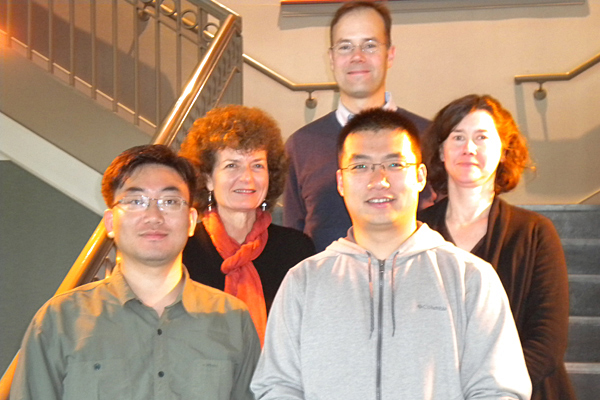
Medicago genome
DBI research team works to sequence, assemble, annotate medicago genome
1:38 p.m., Nov. 16, 2011--Contributing to an international effort to provide insights into how gene regulation occurs in plants, three University of Delaware professors at the Delaware Biotechnology Institute (DBI) teamed up with the international Medicago Genome Consortium to sequence, assemble and annotate the genome of the plant medicago.
The work published in the international scientific journal Nature, “The Medicago Genome Provides Insight into the Evolution of Rhizobial Symbiosis,” includes contributions from Janine Sherrier, professor in the Department of Plant and Soil Sciences; Blake Meyers, Edward F. and Elizabeth Goodman Rosenberg Professor and chair of the Department of Plant and Soil Sciences; and Pam Green, Crawford H. Greenewalt Chair, professor of plant and soil sciences and professor of marine studies.
Research Stories
Chronic wounds
Prof. Heck's legacy
This work centered on medicago, a genus that includes both the crop plant alfalfa and the species that was sequenced, Medicago truncatula. The sequenced species is often used as a model since it is similar to other important legume crops such as soybeans, peas and peanuts. Legumes are important crop plants because they interact with microbes to get nutrition from the environment, revitalizing nutrient-depleted soils, providing proteins and minerals.
The UD work was focused on efforts to discover and annotate small RNAs, a recently discovered class type of RNA that regulates how plant traits are derived from DNA.
UD’s contribution was part of a larger U.S. Department of Agriculture-funded research study being conducted by Sherrier, Meyers and Green using high-throughput sequencing in the labs at DBI.
By collaborating with the consortium, they were able to combine results from research supported by the National Science Foundation, University of Oklahoma, J. Craig Venter Institute, Genoscope, the Wellcome Trust Sanger Institute, University of Minnesota, CNRS/INRA-Toulouse, John Innes Centre, Noble Foundation, University of Wageningen, MIPS, Ghent University and the National Center for Genome Resources (NCGR) to generate a comprehensive resource for the global research community. Altogether, 128 co-authors contributed to this work from 31 institutions spanning eight countries.
“We coordinated and integrated results from related scientific studies to generate something that is more useful and powerful than the individual studies presented separately,” Sherrier said. “The collaboration allowed us to make important discoveries into how plants distinguish between friend or foe among microbes.”
“This is an exciting genome to have annotated,” Meyers said. “It represents a model plant providing tremendous value for basic research. It’s very rewarding that we were able to develop this and be among the first to use this resource for exciting discoveries in plant biology.”
With the annotation of the medicago genome, scientists can use this information in comparison with other important crop genomes, such as other legumes, to determine ways to make crops more digestible, drought tolerant, grow bigger leaves, and much more.
“It just goes to show the kind of cutting edge research that can take place when scientists work together with the most qualified people to bring the best possible information to the community,” Sherrier said. “The work we’re doing on this plant adds a tool to our arsenal for generating better crops.”
“We’re excited about how the genomic information that this manuscript presents will accelerate research in medicago, other legumes, and beyond,” Green added.
A large part of this research was conducted by the students and postdocs in the Sherrier, Meyers and Green labs, allowing them to fully engage in an international research experience that will better their education.
“This project provided our students and postdocs with unique training opportunities,” Sherrier said. “Our students were able to attend conferences, and develop collaborations. It will also allow them to apply knowledge learned from this research to upcoming studies.”
Article by Laura Crozier








